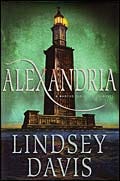The spring of A.D. 77 finds Marcus Didius Falco, informer to the Roman Emperor, vacationing in Alexandria with his wife and children. It's his nineteenth stint as narrator in this long-running mystery series, and for some reason, no one in Alexandria seems to believe he really and truly is just on vacation. His wife, he explains, wants "to one day see all the Seven Wonders of the World." In Egypt, they will be able to tick off the Pyramids and the lighthouse at Pharos while visiting his disreputable uncle Fulvius.
Perhaps most impressive is the Great Library. Said to have been destroyed by Julius Caesar when he conquered Egypt in 47 B.C., the Library probably survived at least into the reign of Domitian (A.D. 81-96), and possibly much later. Caesar's fire burned the harbor area, where some warehouses may have contained quantities of books, but not the library district. So when Falco and his family arrive, the Library, though somewhat in decline, is still the functioning first-century equivalent of a university. Falco's young brother-in-law is keen to enroll.
Unfortunately, the sudden death of the Librarian shortly after attending a dinner party with Fulvius, Falco and family, sets off an academic wrangle of the kind all too familiar to modern university faculty. Of course, the modern wrangle probably would not involve an in-house rivalry between the astronomer and the zookeeper or an attack by an oversized, man-eating crocodile. An inverse of the locked-room puzzle appears, too: Why would a man who appears to have died at his desk without violence have been locked into his office from the outside?
Falco narrates in a slangy, colloquial English, surely the counterpart to the slangy, colloquial Latin an Imperial informer familiar with the mean streets of Rome would have spoken. He also has a cheerfully cynical sense of humor and when not wrestling angry crocodiles makes a capital tour guide to the sights of first-century Alexandria. (2009; 338 pages, including a handy list of characters)




